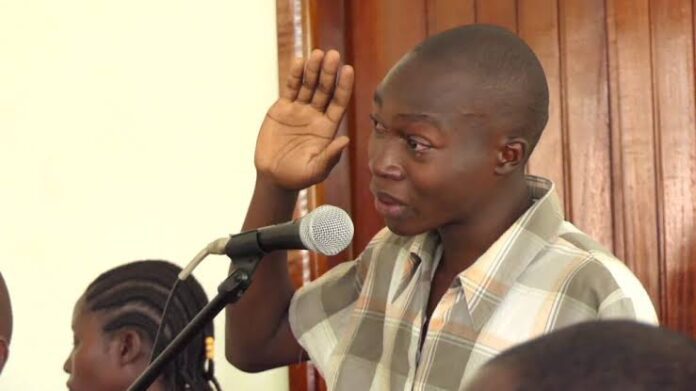Social media is a medium of communication and is part and parcel of the integral media, which includes mainstream media, print, and other online media.
However, the increased usage of social media has also made its misuse inevitable. There have been so many cases of cyber harassment, including harassment of families of fallen government officials’, cyberstalking, hate speech, and sectarian tendencies, misinformation, and disinformation, among others, and these have resulted in a number of content creators languishing in different government prisons.
In November 2024, Emmanuel Nabugodi appeared for sentencing after pleading guilty to four charges, including hate speech and spreading malicious information about the president.
A 21-year-old has become the latest Ugandan TikToker to be sent to prison for creating a video that was said to insult President Yoweri Museveni. He was sentenced to 32 months in jail.
Nabugodi, known for sharing comedy content with his 20,000 followers, made a film of a mock trial of a dog called Yoweri Museveni (Ugandan President). In it he called for Museveni’s public flogging.
On the same day, another content creator, Juma Musuza, commonly known as ‘Madubala,’ was also charged with six counts by the same court, which were committed on his TikTok account, and was subsequently remanded until December 13th.
On his X handle, on November 7th, NUP party president Robert Kyagulanyi condemned the arrest and detention of Juma Musuuza ‘Madhubala.’
Is this social media misuse yet to end? With the emergence of false and hidden identities seeming not to be ending soon, this leaves a number of social media users and non-users vulnerable to attacks and other adverse effects of these misuses.
What could be the solution to false identities on social media?
Today, we are seeing a lot of nudes and pornography ‘going viral’ on social media, which is a moral worry to the society. A morally degenerate population is a bigger threat to law and order in the society.
I personally call for serious purges to protect the society and our children from this kind of moral degeneration.
Hacking of social media spaces, for example, WhatsApp, Facebook, and X, has also been inevitable, and this has resulted in a lot of monetary scams, leakage of privacy, and cyber-harassment by the hackers.
Politically, on July 23, 2024, foreign-influenced youths, in heated social media anger, organized themselves in the March to Parliament protests opposing what they termed as the increased corruption and non-accountability tendencies at Parliament and other government agencies, calling for the resignation of the speaker, Rt Hon Anita Among, despite the protests having been declared illegal by the Ugandan police.
These had initially been anticipated to be massive protests but became floppy due to several de-campaigning efforts from Uganda’s intelligence organizations that exposed the foreign aid and influence behind the protests.
The protests exposed some foreign players who are interested in destabilizing Uganda. Some of the youth that were arrested confessed to receiving mysterious funds to go and protest.
There has also been a rise of radical revolutionaries on social media using un-recognizable identities and fake accounts who are endlessly misusing the civic space offered by social media to call for radical and violent termination of the regime, spreading hate and sectarian propaganda, among other things.
It is very key to note that social media has caused the fall of governments in Sudan and Egypt. Also, after the successful military coup that overthrew Guinean president Alpha Conde by a military junta led by Captain Musa Doumbouya, the initial announcements of the overthrow of the government were made via social media.
This means that social media aids both democratic and undemocratic change of governments.
Disinformation and misinformation have become the order of the day, with a lot of propaganda and false news spreading like wildfires every day. Both propaganda and false news can easily instigate the population into violence, especially during election periods or even during post-elections. It is key to note that Uganda has presidential, parliamentary, and local government campaigns next year as the nation gears up for the 2026 elections.
When unregulated propaganda supersedes social and economic transformational information by the government about health services, universal education, fiscal policy, corruption, government programs like the PDM, etc., it is easy for the population and the international community to believe that the government is useless and therefore needs to raise up or use violence to overthrow (get rid of) the government.
Is social media misuse yet to end? That’s the worry for all of us because a checkered social media is dangerous to users, to governments, and to the state.
Is it the end of the beginning or the beginning of the end to social media misuse in Uganda?
Richard Bard Byamukama is a lawyer and also a security studies expert.















